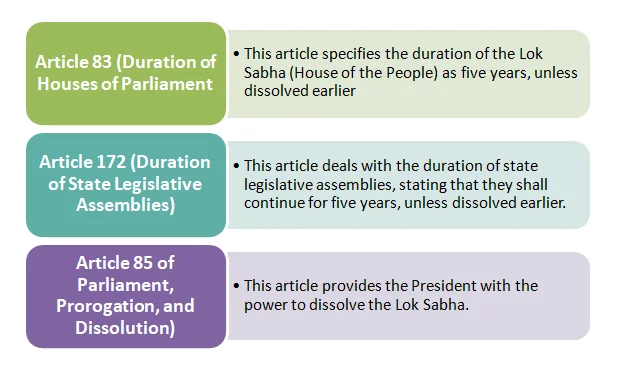The concept of “Simultaneous Elections“ in India suggests holding parliamentary and state assembly elections at the same time every five years. This idea aims to streamline the electoral process and reduce the frequency of elections. Proposed by the Law Commission in 1999, it has been the subject of discussion due to its potential benefits and challenges. A High-Level Committee has been formed to examine this proposal and provide recommendations.
Enroll now for UPSC Online Course
One Nation, One Election: Evaluating the Proposal for Simultaneous Elections in India
Concept of Simultaneous Elections in India
- “Simultaneous Election” is a concept which proposes holding elections in India i.e. parliamentary, and state assembly , simultaneously, once every five years.
- Objective: Therefore, this idea is to synchronise the electoral timing of elections to the Lok Sabha and State Assembly.
- Advocacy by the Law Commission: Idea for conducting Simultaneous Elections was advocated in 1999 by the Law Commission headed by BP Jeevan Reddy.
- Formation of High-Level Committee: The High-Level Committee is constituted by the Government under the chairpersonship of Shri Ram Nath Kovind former President of India to examine the issues relating to holding of simultaneous elections in the country and make recommendations
Historical Background and Present Context for One Election
- Historical Practice: This concept was practised till 1967, but it was disrupted due to reasons such as defections, dismissals, and dissolutions of government.
- The cycle was first broken when the Centre invoked Article 356 to dismiss the then-Kerala government in 1959.
- Impact of Legislative Assembly Dissolutions: Thereafter, several Legislative Assemblies were dissolved post-1960 leading to separate polls for Lok Sabha and State Assemblies.
- Current Situations: At present, the assembly polls in the States of Arunachal Pradesh, Sikkim, Andhra Pradesh and Odisha are held together with the Lok Sabha elections.
Constitutional Provisions

Supporting Arguments of One Election
| Engagement of Security Forces |
|
| Cost Savings |
|
| Efficient Use of Resources |
|
| Enhanced Voter Turnout |
|
Arguments Against One Elections
| Constitutional and Legal Issues |
|
| Potential Dominance of National Issues |
|
| Feasibility |
|
| Logistical Challenges |
|
| Reduction in Political Accountability |
|
| Challenge to Cooperative Federalism |
|
| Political Opposition |
|
Way Forward
- Building of Consensus: There is a need to build consensus from all national and state parties on the need for one election.
- This could be done through dialogue, consultation, and deliberation among various stakeholders.
- Investing in Infrastructure and Technology: It is required for conducting simultaneous elections, such as Electronic Voting Machines(EVM), Voter-Verified Paper Audit Trail(VVPAT).
- Adjustment with Electoral Cycles: Aligning the electoral cycles of Lok Sabha and State Assemblies by either extending or curtailing their terms.
- Establishing a Legal Framework: To deal with situations such as premature dissolution of assemblies, no-confidence motions, hung parliaments, etc., that may arise during simultaneous elections.
- Creation of Awareness among the voters: The voters should be made aware of the benefits and challenges of simultaneous elections, and be ensured that they are able to exercise their franchise without confusion or inconvenience.
Enroll now for UPSC Online Course
| Must Read | |
| Current Affairs | Editorial Analysis |
| Upsc Notes | Upsc Blogs |
| NCERT Notes | Free Main Answer Writing |
Conclusion
The “One Nation, One Election” proposal is a complex issue that could significantly affect India’s democracy.
- It requires careful consideration and consensus among political parties, along with adjustments to existing laws and electoral practices.
- Engaging with voters and addressing their concerns is essential to implement this idea effectively. Further study and dialogue are needed to understand its implications for the country’s political landscape.
Sign up for the PWOnlyIAS Online Course by Physics Wallah and start your journey to IAS success today!
| Related Articles | |
| Simultaneous Elections | President of India |
| 2024 Lok Sabha Election Results Live Updates | LAW COMMISSION OF INDIA |

 GS Foundation
GS Foundation Optional Course
Optional Course Combo Courses
Combo Courses Degree Program
Degree Program









